May 15, 2025 | 18:37 GMT +7
May 15, 2025 | 18:37 GMT +7
Hotline: 0913.378.918
May 15, 2025 | 18:37 GMT +7
Hotline: 0913.378.918
Gia Bao Group Corporation is one of the few cashew businesses in Binh Phuoc that has partnered with cashew farmers to establish a raw material area. To date, the company has acquired nearly 800 ha of cashew land both within and outside Binh Phuoc province.
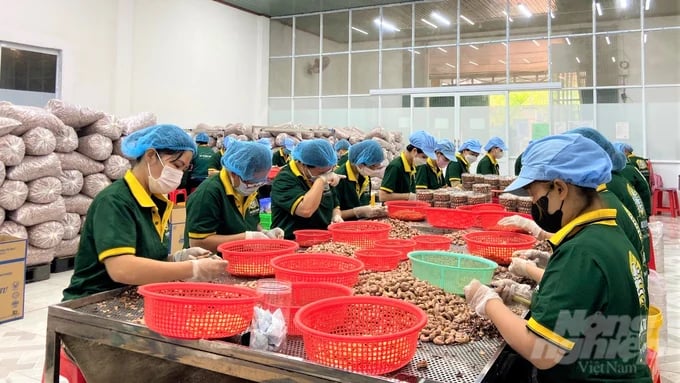
Thanks to its large raw material area, Gia Bao Company maintains stable production. Photo: Thanh Son.
In 2023, due to ensuring criteria for hygiene and safety throughout all stages, from cultivation to processing, without using chemicals or harmful colourants, the cashew product 'Mrs. Tu Binh Phuoc' from Gia Bao was honoured to receive the National Outstanding Rural Industrial Product Brand Award. Currently, the 'Mrs. Tu Binh Phuoc's cashew product under the Gia Bao brand is available in many large domestic supermarket chains such as BigC, AEON, and Satra, and is exported to many countries worldwide such as Japan, Australia, South Korea, and China...
Not stopping there, with the ambition to build a sustainable green cashew industry and improve the livelihoods of cashew farmers, the Green Cashew Project was recently officially launched by Gia Bao Group in collaboration with the social enterprise "Green Journey".
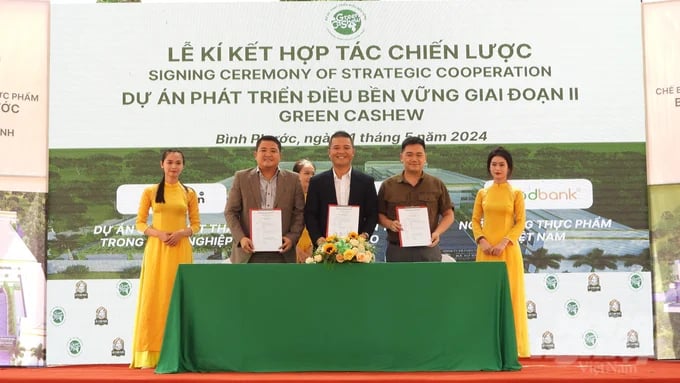
Continuing its success, the Green Cashew Project, recently initiated by the Gia Bao Group in collaboration with the social enterprise Green Journey, has been officially launched. Photo: Tran Trung.
The project aims to establish a green agricultural processing centre in the cashew capital of Binh Phuoc. Through this, it creates opportunities to develop the value of agricultural products in general and speciality cashew products in Binh Phuoc province and neighbouring provinces and cities.
The Green Cashew Project not only focuses on cashew nuts and cashew trees but also aims to create sustainable livelihoods under cashew trees for farmers, especially ethnic minorities. They are the ones who have long been associated with cashew trees - the "poverty reduction" trees in Binh Phuoc and some other provinces in the Southern region.
The Green Cashew Project aims to promote sustainable development of the cashew industry in Binh Phuoc while raising funds through the introduction of its green cashew products to support food aid and improve nutrition for disadvantaged children and vulnerable individuals in the community.
To concretize its goals, in May of this year, the Ba Tu Binh Phuoc Agricultural and Food Processing Plant, with a total investment of $ 6.5 million on an area of 20,000 m2 and a capacity of 400,000 tons/year, officially commenced construction of Gia Bao Group in Hamlet 2, Dong Tam Commune, Dong Phu District, Binh Phuoc Province. The plant is scheduled to be completed by June 2025.
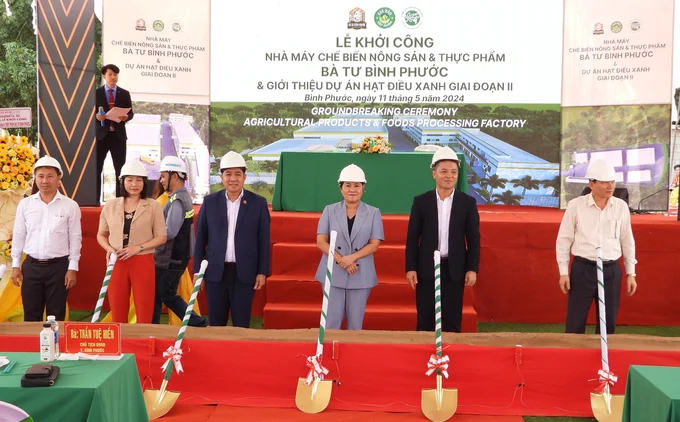
To specify the goals, in May of the previous year, the Ba Tu Binh Phuoc Agricultural and Food Processing Plant was officially commenced. Photo: Tran Trung.
The green cashew processing system established in Binh Phuoc also serves as a local labour attraction, particularly creating a working environment for the community of ethnic minorities with a rich cultural heritage associated with cashew trees for decades.
"The establishment of the green cashew plant in Binh Phuoc is not only about elevating the cashew industry to new heights but also our contribution to the overall development in the trend of greening Vietnam's agriculture", emphasized Mr Tran Van Son.
According to Mr Tran Van Phuong, Deputy Director of the Department of Agriculture and Rural Development of Binh Phuoc Province: "Cashew products from Binh Phuoc are exported to over 100 countries and territories worldwide, including Europe, America, Japan, Australia, China... It can be affirmed that the cashew processing industry has contributed to a significant transformation in the agricultural production structure of Binh Phuoc from self-sufficient farming to modern agriculture towards green and sustainable growth".
The commercial cashew cultivation area in Vietnam is currently about 320,000 hectares. With such a large area, cashew trees have great potential for carbon credits, thereby providing additional income for cashew farmers.
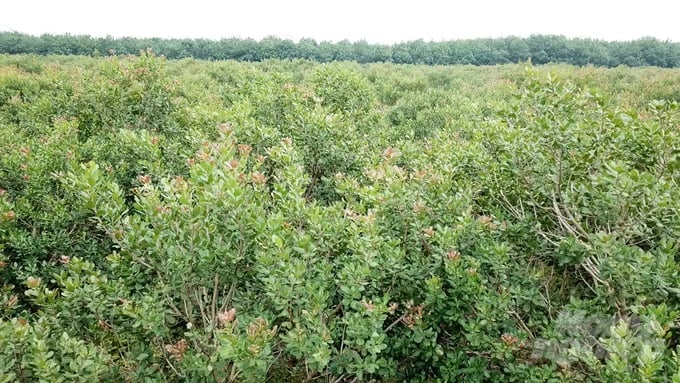
Carbon credits from cashew trees are expected to contribute to the sustainable development of the cashew industry. Photo: Thanh Son.
According to experts, cashew trees generate a high value of carbon credits. On average, each cashew tree can absorb 400 kg of carbon throughout its lifetime. If planted according to international standards, every 2.5 cashew tree will generate one carbon credit (1 ton of CO2). With an average of 200 cashew trees planted per hectare, this corresponds to the creation of 80 carbon credits. Considering the unit price of $ 5/ton, if the forestry sector successfully sold 10.3 million carbon credits in 2023, then the commercial value of carbon credits in the cashew industry is substantial, reaching tens of millions of carbon credits.
With the goal of contributing to the green and sustainable development of the cashew industry, the Green Cashew Project also sets an important objective of supporting cashew farmers in enhancing production and business capacity while reducing carbon emissions. Additionally, it collaborates with relevant parties to assess and measure carbon credits from cashew trees.
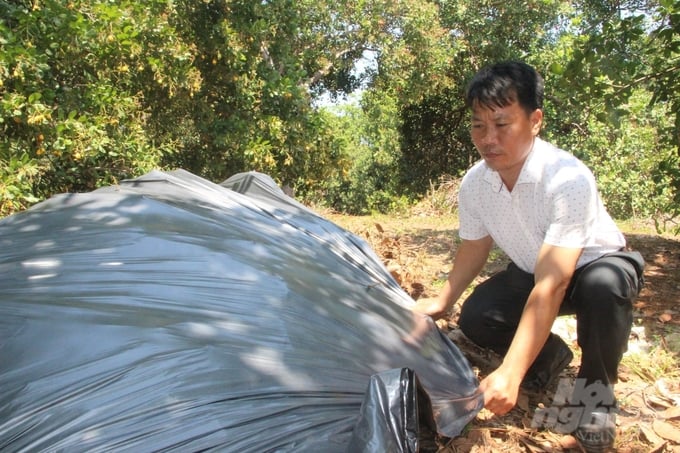
Cashew farmers in Binh Phuoc are actively engaged in organic production, reducing emissions, and embracing carbon credits. Photo: Tran Trung.
Assessing the aforementioned goals of the Green Cashew Project, Dr Nguyen Quoc Trung, an expert in carbon emission reduction and Director of AgriCarbon, emphasizes that sustainable development in the economy, environment, and society requires strategies to reduce emissions and enhance carbon storage, particularly through forests and crops. Therefore, the enormous potential of carbon credits will provide significant benefits to cashew farmers.
Dr Nguyen Quoc Trung asserts, "Measures to reduce carbon emissions in the cashew processing process not only enhance production efficiency but also contribute positively to environmental protection and mitigating the impact of climate change. The commencement of the green cashew processing plant in Binh Phuoc not only brings economic benefits to the locality but also opens up opportunities to apply sustainable solutions in the agricultural sector, contributing to global carbon emission reduction goals".
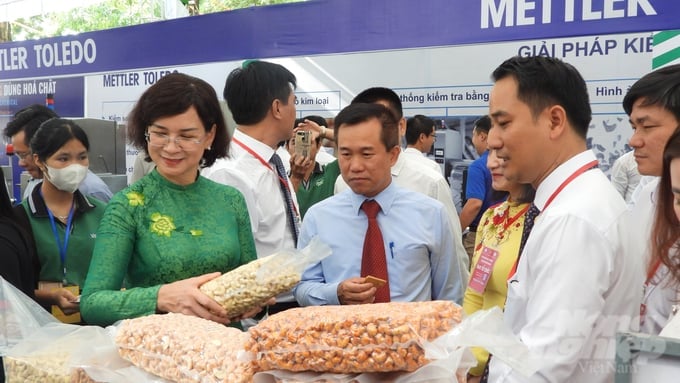
Developing the cashew raw material area in an environmentally friendly and sustainable manner is believed to help Binh Phuoc province attract more investors to the cashew processing and export industry. Photo: Thanh Son.
Mr Tran Van Son shared, "Vietnam is a leading exporter of cashew nuts in the world. The cashew industry in Vietnam has many opportunities, but also faces many new challenges in the context of fierce competition and fluctuations in the economic and social environment".
Translated by Hoang Duy

(VAN) Veterinary training should focus on quality, not just quantity. Veterinarians also need more options to pursue specialized training.

(VAN) The veterinary industry needs to be viewed objectively and further invested in to properly demonstrate its role and importance in the new context.

(VAN) The number of veterinarians graduating each year is not enough to meet actual needs, hence a difficult problem for the growing livestock industry.

(VAN) The strategic partnership between Cambodia, the Philippines, Vietnam, and CGIAR ensures that innovative solutions effectively address national priorities for food system development.

(VAN) This was affirmed by the UK Minister of State at the Department for Environment, Food and Rural Affairs during a working session with Deputy Minister Tran Thanh Nam on May 13.
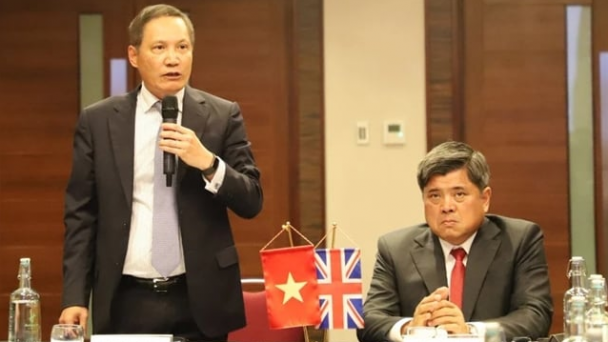
(VAN) On May 13, the Ministry of Agriculture and Environment, in coordination with the Embassy of Vietnam in the United Kingdom, organized a seminar titled 'Connecting trade in Vietnam-UK agricultural, forestry, and fishery products'.
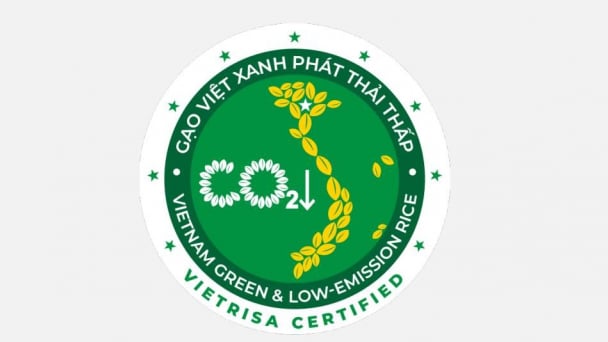
(VAN) The launch of the Vietnam green and low-emission rice brand is a positive signal for both businesses and farmers, marking readiness to reach new heights in the global market.